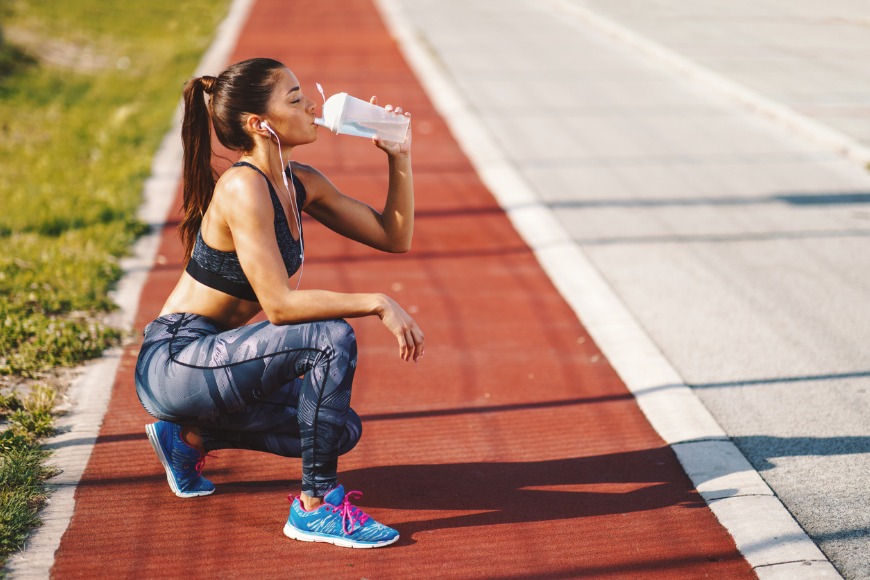
The Importance of Hydration in Sports
Proper hydration is a cornerstone of athletic performance and overall health. Whether you are a professional athlete or a fitness enthusiast, staying well-hydrated can significantly impact your energy levels, physical performance, and recovery. Water is essential for every bodily function, and its importance is magnified when you are physically active. Understanding the benefits of hydration, the risks of dehydration, and how to stay adequately hydrated can improve your athletic performance and well-being.
Why Hydration is Crucial in Sports
Hydration is critical for a variety of reasons, particularly during physical activity. Here’s why staying hydrated is essential for athletes:
1. Maintains Fluid Balance The human body is composed of about 60% water, and proper hydration helps maintain the balance of bodily fluids. These fluids regulate temperature, transport nutrients, remove waste products, and enable proper muscle function. When you exercise, you lose fluids through sweat, and replenishing them is crucial to maintain this balance.
2. Regulates Body Temperature When you engage in sports or intense physical activity, your body temperature rises. Sweating is the body’s natural mechanism to cool down. Proper hydration ensures that you have enough fluid to produce sweat, which helps regulate your body temperature. Without sufficient hydration, your body struggles to cool itself, increasing the risk of heat-related illnesses like heat exhaustion and heatstroke.
3. Enhances Athletic Performance Even slight dehydration can have a noticeable impact on your performance. Losing just 2% of your body weight through sweat can impair physical abilities, decrease endurance, reduce strength, and slow reaction times. Staying hydrated keeps your muscles functioning optimally, maintains energy levels, and helps you perform at your best.
4. Supports Muscle Function and Recovery Water is vital for muscle health and function. Proper hydration keeps muscles well-nourished and ensures they receive adequate oxygen and nutrients. It also prevents muscle cramps and helps flush out lactic acid, a by-product of intense exercise that can cause muscle soreness. Staying hydrated also aids in faster recovery post-exercise, reducing fatigue and muscle soreness.
5. Boosts Mental Focus and Concentration Hydration plays a significant role in cognitive function. Dehydration can lead to mental fatigue, decreased focus, and poor decision-making—critical elements for athletes, especially in high-intensity or endurance sports. Staying hydrated supports mental clarity and quick thinking, helping you stay sharp and focused during competitions.
Risks of Dehydration in Sports
Dehydration occurs when the body loses more fluids than it takes in. This can lead to a range of negative consequences, especially for athletes:
1. Decreased Performance Dehydration reduces the blood volume, leading to decreased blood flow and a drop in oxygen and nutrient delivery to muscles. This results in fatigue, slower reflexes, and diminished stamina.
2. Heat-Related Illnesses Without adequate hydration, your body struggles to regulate temperature. This can lead to heat-related conditions such as heat exhaustion, heat cramps, and in severe cases, heatstroke. These conditions can be life-threatening if not addressed promptly.
3. Muscle Cramps and Fatigue When you sweat, you lose not only water but also electrolytes like sodium, potassium, and magnesium, which are essential for muscle function. Low electrolyte levels can cause muscle cramps, spasms, and fatigue, impacting your ability to continue exercising.
4. Impaired Mental Performance Dehydration affects cognitive function, leading to poor concentration, slower reaction times, and impaired decision-making. In sports that require quick thinking and strategic planning, dehydration can be a significant disadvantage.
5. Increased Risk of Injury Dehydration can lead to dizziness, poor coordination, and muscle weakness, increasing the likelihood of injuries such as sprains, strains, and falls. Proper hydration helps maintain stability and coordination during physical activity.
Signs of Dehydration
Recognizing the early signs of dehydration can help you take action before it impacts your performance or health:
- Thirst (thirst is a late indicator of dehydration)
- Dark yellow or strong-smelling urine
- Dry mouth or sticky feeling in the mouth
- Fatigue or sluggishness
- Dizziness or lightheadedness
- Muscle cramps or stiffness
- Headache
How to Stay Hydrated for Sports
To maintain optimal hydration before, during, and after exercise, consider the following strategies:
1. Start Hydrating Early Begin hydrating well before your workout or competition. Drink plenty of water throughout the day, especially in the hours leading up to your activity. Aim to drink at least 16–20 ounces (about 500–600 ml) of water two to three hours before exercise.
2. Hydrate During Exercise To stay hydrated during physical activity:
- For Short Sessions (less than an hour): Water is usually sufficient.
- For Intense or Long Sessions (over an hour): Consider consuming a sports drink that contains electrolytes (sodium, potassium, and magnesium) and carbohydrates to replenish lost fluids and maintain energy levels.
- Drink Regularly: Sip small amounts of water every 15–20 minutes during exercise, aiming for 7–10 ounces (200–300 ml) per session.
3. Rehydrate After Exercise Rehydration is essential to replenish fluids and electrolytes lost during exercise:
- Drink 20–24 ounces (about 600–700 ml) of water for every pound (0.5 kg) of body weight lost during exercise.
- Include beverages with electrolytes if you’ve had a long, intense workout.
- Consume foods with high water content, such as fruits and vegetables (e.g., watermelon, oranges, cucumbers).
4. Monitor Urine Color Your urine color can be a good indicator of your hydration status. A pale yellow color usually suggests adequate hydration, while dark yellow or amber can indicate dehydration. Monitoring urine output and color throughout the day can help you stay on track.
5. Adjust for Weather and Intensity
- In hot, humid, or high-altitude conditions, your fluid needs may increase. Drink more water to compensate for the extra fluid loss due to sweat.
- For high-intensity sports or endurance events, increase your fluid intake to match the demands of your body.
6. Include Hydrating Foods in Your Diet In addition to drinking water, incorporate hydrating foods that can contribute to your daily fluid needs:
- Fruits: Watermelon, strawberries, oranges, and cantaloupe are over 90% water.
- Vegetables: Cucumbers, celery, lettuce, and tomatoes are rich in water.
- Soups and Broths: Provide fluids and electrolytes.
- Smoothies: Combine fruits, vegetables, and a base like coconut water for a hydrating, nutrient-rich drink.
Choosing the Right Hydration for Your Sport
Different sports have different hydration requirements. Here are a few guidelines to keep in mind:
1. Endurance Sports (Running, Cycling, Triathlon)
- Prioritize electrolyte-rich drinks, especially for sessions lasting over an hour.
- Use a hydration belt or backpack for easy access to fluids during long workouts.
2. Team Sports (Soccer, Basketball, Football)
- Keep water or sports drinks readily available on the sidelines.
- Encourage regular hydration breaks, even if athletes don’t feel thirsty.
3. High-Intensity Workouts (CrossFit, HIIT, Weightlifting)
- Water is typically sufficient, but if the session is over an hour, a sports drink can help maintain energy levels.
- Sip fluids between sets or exercises to avoid dehydration.
Common Myths About Hydration
There are several myths about hydration that athletes should be aware of:
Myth 1: Only Drink When Thirsty Thirst is not always an accurate indicator of hydration needs, especially during intense activity. By the time you feel thirsty, you may already be mildly dehydrated.
Myth 2: All Beverages Hydrate Equally Not all drinks are created equal. Alcohol and caffeinated beverages can have a diuretic effect, leading to increased fluid loss. Stick to water, sports drinks, and electrolyte-rich beverages for optimal hydration.
Myth 3: Drinking Too Much Water Is Harmless Overhydration, or hyponatremia, is a condition that occurs when you consume too much water without adequate electrolyte intake. This can dilute sodium levels in the blood and lead to severe health issues. Balance water intake with electrolyte consumption during prolonged physical activity.
Conclusion
Hydration is a key factor in athletic performance, recovery, and overall health. Proper hydration supports muscle function, regulates body temperature, enhances endurance, and sharpens mental focus. By understanding your body’s hydration needs, monitoring fluid intake, and adjusting for different conditions, you can optimize your performance and reduce the risk of dehydration-related issues. Whether you are training for a marathon, playing a team sport, or enjoying a workout, make hydration a top priority for peak physical and mental performance.



